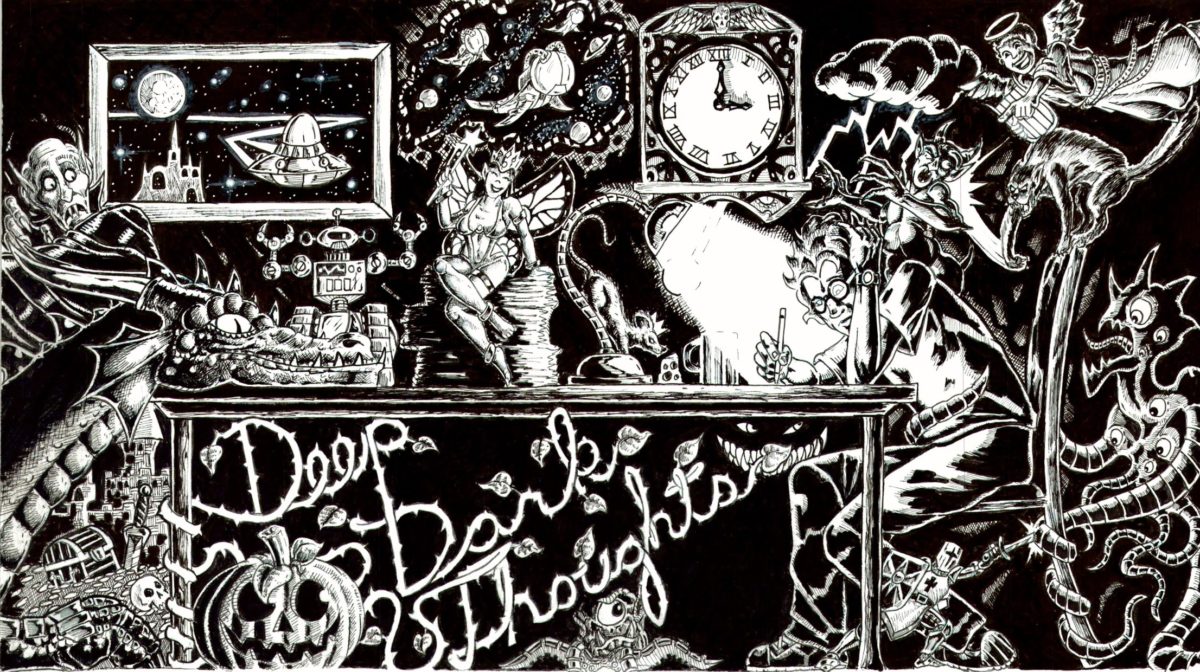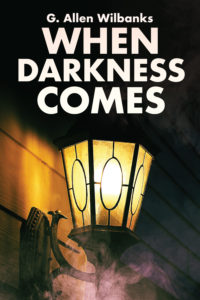
From Not for Bedtime Stories, by G. Allen Wilbanks
A MOTHER’S LOVE
Elizabeth stood motionless in the corner of the dark nursery. She did not turn on a light, but instead let the shadows caress and conceal her while she hovered in her indecision. Despite the darkness, she could see the small form huddled in the crib clearly, and she knew, should it wake, it would see her just as easily. The blanket-swaddled mass moved rhythmically and almost soundlessly as it drew air in and out of its tiny lungs. Only the fragile hiss of air passing its rosebud lips with each exhalation disturbed the otherwise perfect quiet of the room. The noise was so slight Elizabeth might have missed it had she not been listening so closely.
To most new mothers, the sound of a child’s breath comes as a great comfort, a reassurance that the baby is alive and will wake in due time, hungry and needing of attention. But her child’s whispered sighs gave no comfort to Elizabeth. The sound taunted her.
Silence and shadows ruled the rest of the house as well. Had Elizabeth opened the nursery door right now she would have heard her husband’s light snoring from where he remained asleep in their room. She envied his blissful retreat from reality into the world of sleep. She had been unable to make the journey herself. Her mind, unable to quiet and unwilling to rest, had finally driven her from their bed.
When she entered the room where the child lay and closed the door behind her, she had not known exactly why she was there. She only knew that she had some deep need pushing her tonight. Elizabeth crossed to the tall wooden rocking chair that had given her so many hours of comfort during her pregnancy, intending to sit and wait for dawn or for sleep, whichever should find her first. But, as she moved the small, embroidered hand pillow resting on the seat, the feel of the material in her hand sent a shock up her arm into her roiling mind. Her thoughts clarified in an instant, and she knew without a doubt why she had come.
When the child was born, Elizabeth had chosen the name Michael for the new arrival. It was her grandfather’s name and she had selected it to pay tribute to what he had meant to her before his death just a few months previously. The name was special to her and she could not wait to bestow it on the new member of her family. But when the child left her body, she knew immediately that it would never carry the name Michael, or any other human name. Not to her.
Elizabeth knew something was wrong with the writhing mass of purple and pink flesh the moment the doctor laid it on her breast. The squalling thing had gazed at her, covered in her blood and coated with the slick white film of birth; its toothless maw agape and screaming obscenities in a language she could not understand. She had refused to address it by the name she had chosen. The creature was not human. It was not her baby, and to call it Michael would be to give a semblance of normalcy to the evil that had been thrust upon her. She would not give lie to the horror and pretend nothing had happened. She could not hide from the truth of its monstrosity. Perhaps others could blind themselves and smile and coo at this horrid mockery of life, but she simply could not.
She pushed the child away.
Her husband lifted the crying baby from her, a startled and hurt expression on his face. He did not understand her reaction. He did not see the truth. Elizabeth began to cry, turning away from both of them and burying her face against the stiff, uncomfortable hospital pillow.
Now, three weeks later, Elizabeth still would not speak the name of a child that did not exist. She stood in the shadows of the nursery, feeling an even greater darkness building inside of her. The darkness of being alone, of being the only one capable of seeing the evil she had borne into the world.
Elizabeth clutched the hand-embroidered pillow in front of her, holding the white rectangle of material up like a talisman against the creature in the nursery with her. Her fingers curled into bloodless white claws around the smooth, giving material, clinging desperately as though someone might at any minute try to rip the item from her hands. The pillow had been a gift from some well-meaning relative, but it had turned out to be only a cruel reminder. Although it was too dark to read the blue stitched lettering on the pillow’s face, Elizabeth could picture it clearly: It’s A Boy!
The irony was almost laughable, except Elizabeth found nothing about her situation funny. It wasn’t a boy. How could it be a boy? It wasn’t human.
She took a step closer to the crib.
The doctors had told her that her reaction toward the baby was not normal, but also not uncommon. Many new mothers had difficulty accepting their children at first. They gave her long detailed explanations of the hormones in her body and how they could easily be fouled up during pregnancy and childbirth. They threw medical terms and definitions at her, her favorite being postpartum depression. But she had a few terms for them as well: demon, changeling, dybbuk, shedu. Each doctor and nurse, in his or her own self-important, condescending manner told her she was going to be fine and with a little time she would come to love her baby. Elizabeth tried to tell them there was no baby here to love.
They gave her drugs. The medications left her slow and sluggish. The fear remained, but she was left helpless to fight back as her husband placed the writhing leech upon her teat to feed upon her body. Elizabeth imagined the child drawing blood and small ragged pieces of her soul through her sore, hurting nipples. She told herself the baby only wanted milk, but her mind insisted this diseased imitation of human life would destroy her if allowed to suckle just one minute more.
Despite the numbing effects of the sedative, Elizabeth raised her hands to the baby’s head and pushed with all the strength remaining to her. If her husband had not been standing right beside the bed to rescue the child, it might have fallen to the floor, crushing its tiny skull and ending her torment instantly. He caught the child before any harm could come to it. Elizabeth moaned and tried weakly to roll over in her hospital bed.
“Take it away. Away.” She mumbled the words around a drug-thickened tongue, but her well-meaning husband understood. He carried the screaming infant from the room.
That had been the last time the child fed from anything other than a bottle. At least Elizabeth had accomplished that much.
Her breasts still ached occasionally from the milk filling them, from the pressure of the fluids she would not allow the child to draw from her. Sometimes, when the creature cried, her nipples leaked, wetting the front of her blouse with large circular patches around each breast. It infuriated her that the little beast should have control over her body in any way, especially one so visibly obvious.
Elizabeth took a second step.
The floor creaked under the weight of her foot and she froze. The child’s breathing ceased for just a moment, and the tiny hands thrashed briefly beneath the restraining blanket wrapped around its body. Then it relaxed and the slow, rhythmic breathing began once more.
Elizabeth released the breath she did not realize she had been holding. Her heart hammered in her chest, so painful and loud she thought the whole neighborhood must be able to hear it. She glanced guiltily around the room, jerking her head left, then right. She could feel someone watching her and she searched desperately to find the intruder who had slipped into the nursery with her, but she found nothing except stuffed animals, furniture and shadows sharing these four walls.
No one. Yet the feeling did not diminish. Something else about the room had changed as well.
It took only a moment for Elizabeth to realize what the difference was: the child’s breathing had quickened. It was awake! She stared in mounting terror at the tiny face protruding from the bundle of blankets. As she watched, the eyes opened. Tiny pits of blackness perched above cherubic pink cheeks focused on her; bored into her.
It gazed at her, silent, appraising, through the bars of the crib.
The child did not cry out or make a noise of any kind. It merely observed; waiting to see what she might do. In the darkness, the wooden slats of the crib reminded Elizabeth of black iron bars; the type of bars that might be found in a centuries old prison. She could almost smell the decay of the dead and dying wallowing in filth and garbage. Her gorge rose, and she had to fight to shake off the imagery and focus on the task at hand. Although the bars circled the swaddled creature, Elizabeth had no doubt in her mind who was truly the prisoner in this situation.
She took another step.
The child still did not move, but a noise bubbled from its undeveloped throat. A single nonsense syllable that shattered the delicate silence that had sustained Elizabeth to this point. The rules suddenly changed. This was no longer a mission of stealth, it was an attack on an aware enemy. She had to charge forward with her advantages of surprise and deliberation gone. She wanted to move, but her determination began to slip. Someone had cut the strings holding her up.
Elizabeth’s knees buckled, but she knew that if she fell she would never have the strength to try again. With the last of her wavering will, she forced herself forward. Toppling, she fell against the crib, draped her torso over the top rail and pushed the pillow down with both hands over the child’s wide-eyed face.
Want to read more? Purchase Not for Bedtime Stories.






